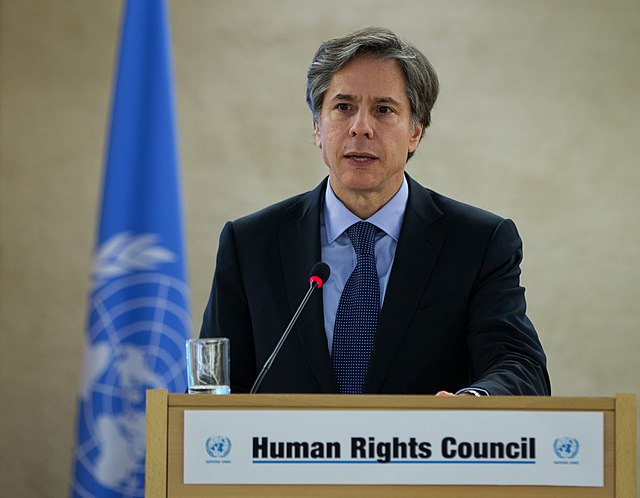WASHINGTON — With the House considering a funding package for just Israel, Secretary of State Antony Blinken and Defense Secretary Lloyd Austin urged senators on Tuesday to pass an “urgent” $106 billion supplemental aid package that also provides financial and military support for Ukraine.
Blinken’s opening remarks at Tuesday’s Senate Appropriations Committee hearing, however, were repeatedly interrupted by protesters calling for a ceasefire in Gaza.
In the days following Hamas’ surprise Oct. 7 attack on Israel that left more than 1,400 people dead, Israel began launching airstrikes against Gaza. According to Gaza’s health ministry, which is governed by Hamas, more than 8,000 Palestinians have died in the ensuing conflict.
About 10 protesters were removed from Tuesday’s hearing, with some repeating the lines “Ceasefire now!” and “Let Gaza live!” About 20 attendees also raised red-stained hands in the air during the hearing to bring attention to the bloodshed in the region.
“Save the children of Gaza! Ceasefire now! Where is your pride America?” said a protester who wore a shirt that read “Stop funding genocide.”
Some anti-war protesters also held signs that read “No Gaza Genocide” and “No $ for War,” and another group chanted “From Palestine to Mexico, all the walls have got to go,” seemingly referencing the funding package’s proposed aid for both Israel and U.S. border security.
The White House’s funding request — which President Joe Biden asked Congress to consider earlier this month — calls for $61.4 billion in funding for Ukraine and $14.3 billion to support Israel’s war against Hamas. Additionally, the White House has asked for $13.6 billion to enhance U.S. border security through the hiring of 1,300 new border patrol agents and 1,600 asylum officers.
Support for Ukraine and Israel is at the bedrock of the Biden administration’s foreign policy strategy. With calls from the United Nations and protests in major U.S. cities calling for a cease-fire, the Israel-Hamas War is expected to have major electoral implications for Biden’s re-election campaign.
During Tuesday’s hearing, Blinken reiterated the White House’s official stance in opposition to a ceasefire in Gaza. He referenced his recent visit to Israel following Hamas’ Oct. 7 attack, detailing to senators some of the photos and videos of violence he witnessed there toward children and families.
“No nation can tolerate that,” Blinken said. “As President Biden has repeatedly made it clear, Israel not only has the right but the obligation to defense and to take try to take every possible step to make sure this doesn’t happen again.”
The Biden administration, Blinken said, is also working to ensure Palestinian civilians in Gaza are protected from violence and have access to key supplies, such as fuel, food and water.
While the “overwhelming majority” of humanitarian resources for Gazan residents are reaching Palestinians, there is still a risk that Hamas could intercept some of those materials, he said. Blinken urged other partners in the region, including Saudi Arabia, to send aid to the Palestinian people in Gaza.
Blinken added that the U.S. maintains its goals to achieve a two-state solution for Israel and the Palestinian territories with an “effective and revitalized” Palestinian Authority governing Gaza, rather than Hamas.
On Israel, Austin also emphasized the importance of addressing underlying tensions in the region, referencing the need to remove Hamas from power in Gaza.
“If you don’t do things to address the underlying causes of instability, then you create a bigger problem or you have a lasting problem that will go on forever and ever,” he said.
Blinken and Austin also pressed an urgent need for continued military assistance for Ukraine in its war against Russia.
In the conflict, which appears to be in a stalemate, Ukraine has made “remarkable progress” and taken back about half of its land, Austin said. But during the hearing, he expressed that Ukraine cannot win against Russia without financial and military support from the U.S. and NATO.
Senators and witnesses at the hearing suggested a halt of funding toward Ukraine could reflect poorly on the U.S.’s standing on the international stage. Blinken said if the U.S. pulls funding from Ukraine, then Russia may feel emboldened to invade a NATO country next.
“It would send a message to would-be aggressors around the world that if he can get away with it, so can we,” he said.
Russian President Vladimir Putin hopes Hamas’ attack on Israel will distract the U.S. from supporting and continuing funding toward Ukraine, Blinken added.
Committee members from both parties expressed support for continued funding for Ukraine, with few dissenters. Sen. Susan Collins (R-Maine), vice chair of the committee, has been a staunch supporter of Ukraine funding in the Senate and expressed similar sentiment Tuesday.
“If we fail to support these efforts, there will be dire consequences that will jeopardize our national security,” Collins said in her opening statement.
Minority Leader Sen. Mitch McConnell (R-Ky.), who was not present at Tuesday’s hearing, has similarly advocated for continued aid to Ukraine, suggesting support from Senate Republicans.
But, securing new aid for Ukraine in the House may be an uphill battle.
Newly elected Speaker Rep. Mike Johnson (R-La.) announced on Monday that the House would pursue a $14.3 billion aid package for Israel by slashing funding allocated to the IRS through the Inflation Reduction Act, one of the Biden administration’s most prized pieces of domestic policy legislation. The aid package does not include new funding for Ukraine.
The Senate Appropriations Committee is expected to make changes to the $106 billion package prior to a vote in the upper chamber. Homeland Security Secretary Alejandro Mayorkas is expected to testify before the committee next week.



